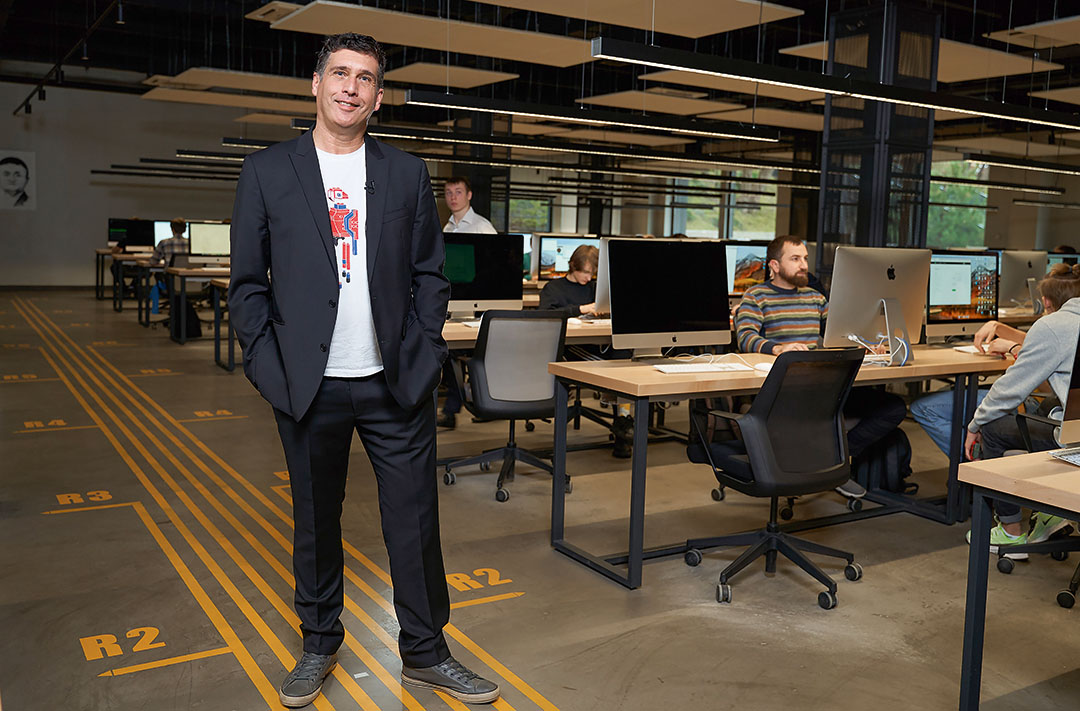The global coronavirus crisis has caused economic pain across the globe and Ukraine has been no exception. Nevertheless, some industries have proven less vulnerable to the negative impact of the pandemic than others. Currently available data indicates that Ukraine’s tech sector has performed better than most during 2020. While the stellar growth rates of the past decade have inevitably suffered a slight decline, the industry remains on track to post yet another year of impressive expansion.
The rise of the Ukrainian IT industry has been one of the country’s most compelling economic success stories since Ukraine first gained independence, but it’s a story that has yet to enjoy the recognition it deserves among international audiences. “It’s still a surprisingly well-kept secret,” says Kyiv-based French tech industry executive Dominique Piotet. “What really surprises me is that most people outside Ukraine don’t realize the powerful potential of the Ukrainian tech industry. I’m constantly amazed by the quality of the talent I encounter here. I’m amazed by the quality of the companies and the products they develop.”
Piotet hopes to play a role in the process of raising international awareness of Ukraine’s IT appeal. After spending seventeen years at the heart of the global tech scene in Silicon Valley, he first arrived in Kyiv eighteen months ago to take up the post of CEO at UNIT.City, Ukraine’s flagship innovation park and one of the largest in Eastern Europe. Piotet is now also president of La French Tech Kyiv, a community that launched in April 2020 with the aim of building business bridges between French and Ukrainian tech sector companies.
La French Tech Kyiv is part of the global La French Tech network, a non-profit initiative with French government backing that brings together a network of regional branches across France itself along with communities in almost 100 cities around the world. While this year’s Ukraine launch was a welcome step, the crisis conditions created by the coronavirus pandemic did not make for a convenient backdrop. “The La French Tech concept is all about bringing people together and organizing networking opportunities, so from that perspective, it’s been a slow start,” says Piotet. With limited scope for physical meetings, the community has relied instead on digital events and online initiatives. Despite these obstacles, the response from within the tech community has been enthusiastic, with over 50 companies joining La France Tech Kyiv during the first half-year.
This is just the beginning. Based on the experience of Le French Tech communities in neighboring countries across Central and Eastern Europe, Piotet believes it is entirely realistic for membership in Kyiv to expand to 500 or more companies. Alongside the growth of the community, another priority for 2021 is creating opportunities for French tech companies to visit Ukraine and see the potential of the country for themselves. Coronavirus-related restrictions on international travel have served as a major obstacle to this kind of engagement, but Piotet is convinced that when it comes to the Ukrainian IT scene, seeing is believing. “We need to be able to travel again. Paris is only three hours away from Kyiv. It is easy to fly between the two cities. I see huge potential benefits from bringing French tech companies to Ukraine,” he says.
Piotet appreciates that successful examples of cooperation are the best advertisements for further Franco-Ukrainian tech sector cooperation. He points to a number of specific cases including French video game giant Ubisoft, the company behind such global blockbusters as Assassin’s Creed. Ubisoft has been present in Ukraine since 2008 and currently maintains a team of more than 800 developers in the country. This is the kind of brand association that the Ukrainian IT industry needs to advertise. It would help, Piotet notes, if Ukraine’s own tech unicorns continued to identify themselves as Ukrainian even after relocating to the US. Ultimately, he says, the challenge is to create a new narrative around Ukraine that moves beyond geopolitical posturing and post-Soviet stereotypes. “We have to change the story. When people talk about Ukraine, they tend to talk about corruption, about Crimea, and about war. This needs to change. I hope La French Tech Kyiv can make a positive contribution to the process.”
It remains impossible to predict when an easing of lockdown conditions will allow for the resumption of regular connections between France and Ukraine, but there will be no shortage of ideas on the agenda when networking opportunities finally do arise. Piotet identifies a number of sectors that might be of particular interest to French tech companies. He has been impressed by the progress of Ukraine’s FinTech segment and the growth of online banking services in the country. He also notes the rapid evolution of technological solutions in the Ukrainian agricultural industry. As two of Europe’s leading agricultural superpowers, Ukraine and France have a shared interest in farming-related tech and could benefit from greater cooperation in this sphere.
As well as offering their own know-how, Piotet believes French tech companies can also bring additional business savvy to the equation. “Ukraine needs a tech industry ecosystem that welcomes investments and is business-friendly,” he says. “We see a lot of Ukrainian startups that are primarily tech-focused, but they must also become more business-oriented in their approach. This is one of the areas where greater cooperation with the French tech sector can be helpful.”
